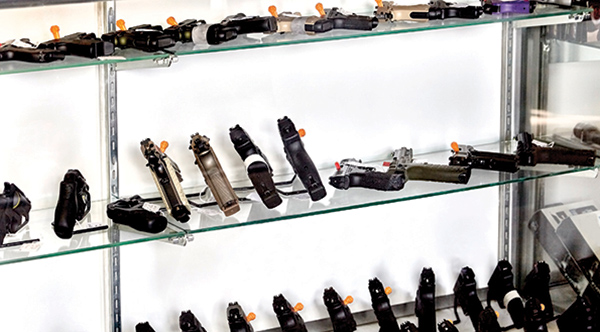The Power of the Pen: What happens behind the scenes
Judges wield tremendous power, often literally with a stroke of their pens as they sign their names on orders and findings. When the cases involve family violence, routine decisions—whether to check the “Brady box” on a protection order, or whether to make the domestic violence determination in a misdemeanor case—can indeed carry life-or-death consequences.
Why is this so? When someone shops for a firearm or ammunition at a federally licensed firearms dealer, that individual must complete a questionnaire as part of the National Instant Background Check System, or NICS. This article explains how that process works, and where trial courts fit into the system.
Established as part of the 1993 federal gun control legislation known as the Brady Handgun Violence Prevention Act (popularly known as the “Brady Bill,”) NICS went online on November 30, 1998.
Readers of a certain age will remember that James Brady, President Ronald Reagan’s press secretary, was seriously wounded in an assassination attempt outside the Washington Hilton Hotel on March 30, 1981. The would-be killer was mentally ill. After the shooting of President Reagan and Brady, which was caught live on television, the nation called for gun laws that would prohibit those with mental illnesses from being able to lawfully purchase firearms and ammunition.
After years of debate, members of Congress reached a compromise: in exchange for new restrictions on who could possess a firearm, the Federal Bureau of Investigation (FBI) would create an instant background check system so that stable, law-abiding citizens wishing to buy firearms would not be inconvenienced.
The Brady Bill expanded the categories of “prohibited persons”—people whom lawmakers considered too dangerous to possess firearms or ammunition. There are now ten (10) “disqualifiers,” or reasons a person would be prohibited under the federal Gun Control Act, which is at 18 U.S. Code §§921-929.
Because of the constitutional principle of dual sovereignty, the federal gun laws apply even if individual state laws are silent or are in conflict with them: both sets of laws remain in full force. The ten federal firearms disqualifiers involve people who are:
- Convicted felons;
- Fugitives from justice (open warrant for either a misdemeanor or a felony);
- Unlawful users or addicted to any controlled substance (note that this can even include convictions for possession of paraphernalia, if the implement tested positive for residue);
- Adjudicated mentally ill, or have been committed to a mental institution. This includes people who have been found not responsible by reason of insanity, or incompetent to stand trial in criminal cases;
- Illegal aliens, or in the U.S. under a nonimmigrant visa;
- Dishonorably discharged from the U.S. armed forces;
- Having been a U.S. citizen, renounced one’s citizenship (the FBI refers to these people as “renouncers”);
- Subject to a protection order (or no-contact order or workplace violence restraining order) involving intimate partners. This does not include ex parte orders, as the respondent needs to have been given notice and an opportunity to be heard;
- Convicted of a misdemeanor crime of domestic violence; and,
- Charged with a felony by either indictment or information.
When a would-be buyer hands his or her completed questionnaire to the dealer at the point of sale, the retailer submits the information to NICS either electronically or by telephone.
 NICS checks three databases instantly: the Interstate Identification Index (III), which contains more than 64 million criminal history records; the National Crime Information Center (NCIC), which holds more than 5.1 million records on active criminal warrants, protection orders, immigration violators, people on supervised release, fugitives, gang members, terrorists, sex offenders, U.S. Secret Service Protective lists, and others; and, NICS’ own “in-house” Index, which contains more than 8.3 million records relating to all ten disqualifiers. For transactions involving non-U.S. citizens, NICS also searches U.S. Customs and Immigration Enforcement (ICE) databases.
NICS checks three databases instantly: the Interstate Identification Index (III), which contains more than 64 million criminal history records; the National Crime Information Center (NCIC), which holds more than 5.1 million records on active criminal warrants, protection orders, immigration violators, people on supervised release, fugitives, gang members, terrorists, sex offenders, U.S. Secret Service Protective lists, and others; and, NICS’ own “in-house” Index, which contains more than 8.3 million records relating to all ten disqualifiers. For transactions involving non-U.S. citizens, NICS also searches U.S. Customs and Immigration Enforcement (ICE) databases.
The volume of queries that NICS processes is staggering. By law, NICS has three days to respond to a query with either a “proceed” or a “denial;” impressively, most transactions are processed in less than two minutes.
Just how busy is NICS? From its inception in 1998 to December 31, 2014, more than 202 million transactions have been processed: 93.4 million by NICS, and 109 million by states using the system.
In 2014, NICS supported nearly 21 million background checks: 8.2 million by NICS staff, and 12.7 million by state users. The busiest day for background checks in 2014 was the day after Thanksgiving, November 28th, when NICS processed more than 175,000 transactions. In the first six months of 2015, NICS processed 482,189 firearms background checks for Indiana. Indiana does not have its own background check system; instead, our state relies on the FBI’s NICS staff to perform the checks.
The historical rejection rate—the “denials” that NICS has issued to prospective buyers since 1999—is a very low 1.6 percent. To date, the most common reason for NICS denials was a felony conviction, at 56 percent.
Denials related to domestic violence—misdemeanor convictions and protection orders combined—made up the next most common reason for rejections, coming in at a total of 14 percent (of which misdemeanors comprised 10 percent).
If, after the three-day period, NICS staff discover through their research that the purchaser wrongly received a “proceed,” the FBI terms the transaction a “delayed denial.” The FBI then contacts the Bureau of Alcohol, Tobacco, Firearms, and Explosives (ATF), which is responsible for retrieving the weapon (unless a state’s law enforcement agency is responsible for its background checks, in which case that agency works on the retrieval).
In 2012, the FBI referred 92,482 denials for investigation—a denial is referred only if it is likely to merit prosecution under ATF and U.S. Attorney criteria. Of those, ATF field offices investigated 5,313 in 2012; more than half—2,986—were delayed denials, thus the purchaser already had the firearm. Just under half of those referrals (2,337) involved the domestic violence disqualifiers. It is vitally important that accurate data get into NICS promptly.
Indiana law (Ind. Code 35-38-1-7.7) requires a judge who is sentencing a defendant for a misdemeanor to determine whether a person has committed a crime of domestic violence as defined in Ind. Code 35-31.5-2-78. The statutorily mandated form resides at: www.in.gov/judiciary/2703.htm.
Once a judge makes a determination, the data on the disqualified individual travels to the Indiana State Police Criminal Justice Data Division, where it is transmitted to NICS. If a court uses Odyssey, this may happen electronically. Otherwise, prosecutors may transmit the data to the state police via their case management system, or the court may mail a copy of the determination to the state police. For protection orders, the process can be as simple as checking a box. These small acts on the part of a court can truly make a huge difference in ensuring a violent individual is prevented from lawfully obtaining a firearm.

